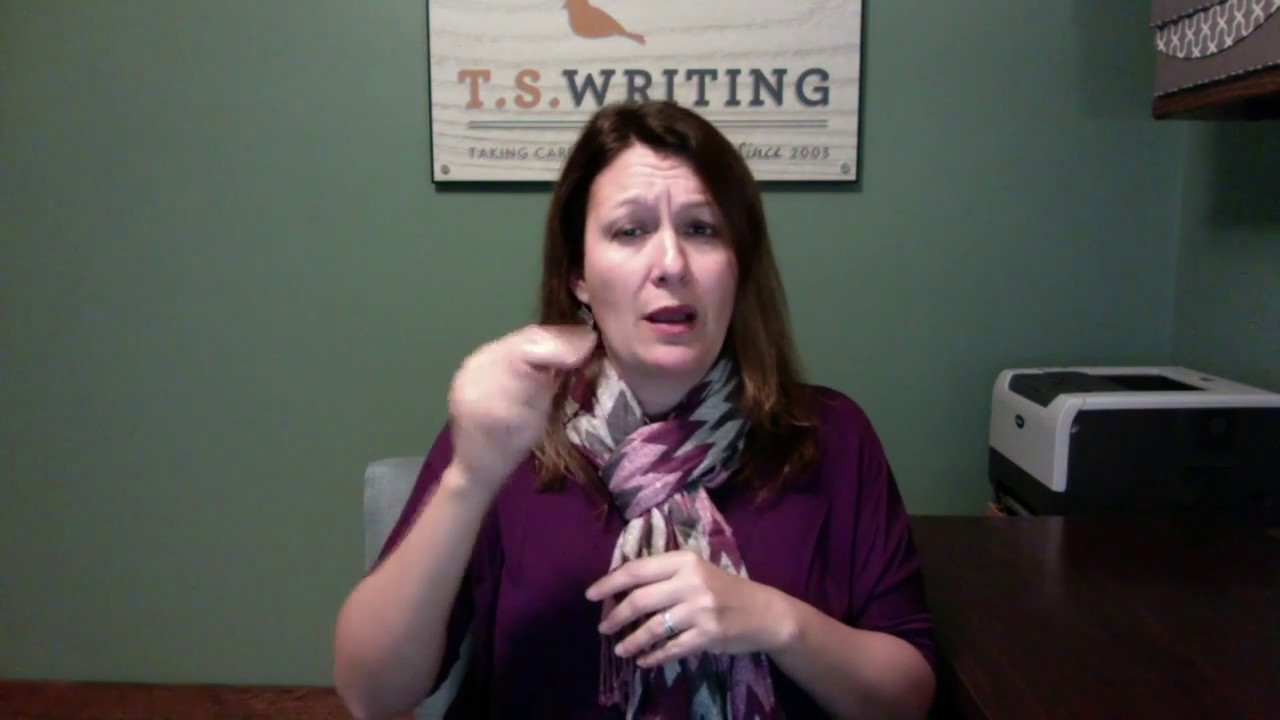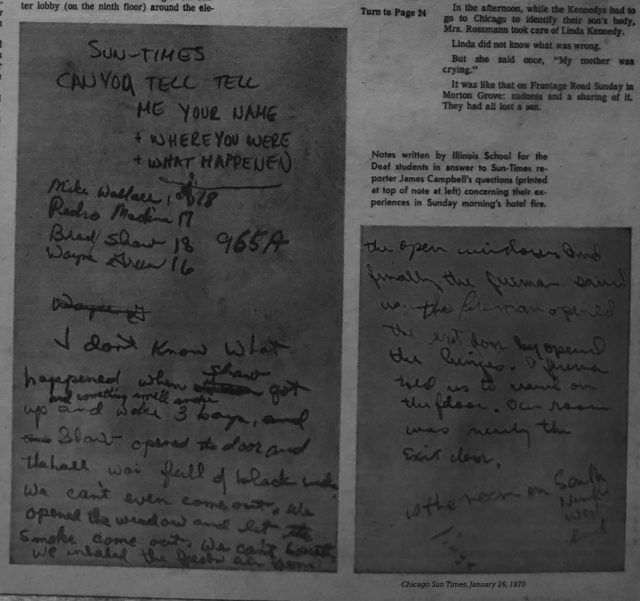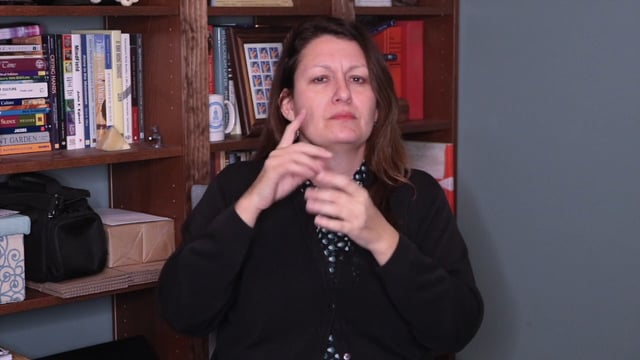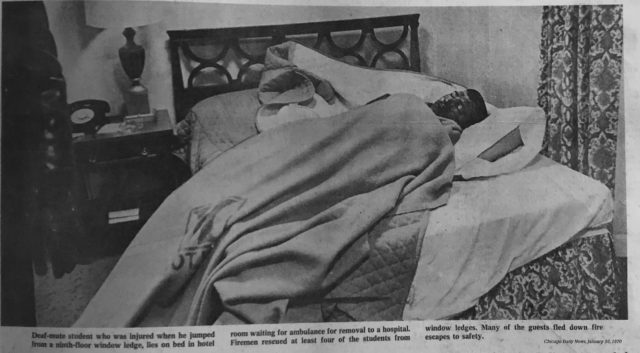This originally appeared at ilhandsandvoices.org.
I was born Deaf to Deaf parents. Because of that, I’ve never gone a single day in my life without full communication access in the home, and I thank my lucky stars for that every day. When I was born, there was no grieving process for my parents or anyone in my family. In fact, it was never an issue. They never thought, “Oh no! My kid is deaf – what do we do?” Just like hearing parents with hearing children, they were more concerned about how to make me stop crying, changing my diapers, and providing the world to me. I also had hearing grandparents who I was very, very close with; they played a huge role in my life.
I’ve never known anything except bilingualism and biculturalism. I’ve always grown up in both worlds, although the Deaf community is definitely home for me. However, to understand where I come from, you have to also understand my parents’ background.
My mother didn’t learn sign language until she was 17. She grew up oral, and is often labeled as hard of hearing by people even though she’s audiologically more deaf than I am and considers herself Deaf. She went to public schools all her life until her junior year, when she went to the Illinois School for the Deaf. She, like me, is an only child. My father was born deaf, and had an older brother who was also deaf (and a hearing sister). He enrolled at the North Carolina School for the Deaf when he was five years old, and stayed there until his graduation in 1970. My stepfather went to both an oral deaf school and then the Illinois School for the Deaf. He was in the same grade with my mom, but they despised each other…until 20 years later, when they met at a bowling tournament. He and my mother married when I was 10 years old, and recently celebrated their 20th anniversary.
So you see, I grew up with an incredible array of communication modes in my house – although ASL was the primary mode, of course. My grandparents couldn’t sign at all, and I don’t speak, so we found a happy medium: gestures and writing back and forth. This type of communication was never an oddity in my house, and my relatives always had paper and pen ready to communicate with me. Even for times when they would talk without my understanding and I was the only Deaf person present, they would always try to include me or let me do my own thing without giving me a hard time. I can’t remember a time when I was left out and felt resentful about it; my family was just so good about that.
So I really am genuine in saying that I’ve always had full communication access at home. I think that’s why friends were forever hanging out at my house – because they could talk to my parents about anything, using ASL- instead of having to fumble over spoken words or cultural differences with their own parents. Even when I went off to college, my friends continued to see my parents socially. Every single one of them would say things to me like, “I feel like your parents are my parents. I’m so jealous that you’re able to talk with them without having to worry about communication.”
At school, communication and comfort zones were a different story, though. I started preschool when I was two years old, and the school asked me to skip kindergarten. I was in self-contained classes, but I was doing work of the older students, who often were academically delayed because of language and communication difficulties. Remember, I had full communication access from day one, using ASL and written English – so I never had language delays. I always knew what was happening in the world around me, thankfully.
Mind you, I didn’t always have the best English skills. It wasn’t until maybe I was seven or eight years old that I finally understood the language and found my second love (the first being ASL, of course!). Anyway, when I was in the second grade, the school decided to mainstream me for an hour each day to see if that would be better for my educational needs. It was. In fact, they found that I was so much ahead of my hearing peers as well that I skipped third grade into a “gifted” fourth/fifth grade classroom where I was mainstreamed half of the day.
I won’t even go into detail about the interpreters, because they were so bad and so unethical by today’s standards. I often had to rely on hearing classmates who could sign to interpret for me. Still, I had a great time that year; it was one of the best times of my years academically and socially. I played softball and soccer, and to this day, continue to keep in touch with some friends from that class.
However, the deaf kids were another story. Most of my intellectual and academic peers had transferred to the Illinois School for the Deaf (ISD) by this point, and I was feeling lonely because even though I had [hearing] friends, there’s nothing that equals kids who can sign fluently and are also Deaf. My mom asked me what I wanted to do, and I told her I wanted to transfer to ISD.
The next year, for the sixth grade, I transferred to ISD. I felt as if I had come home again. It was fantastic being among people who signed and were as bicultural as I was. But ISD and surrounding public schools in Jacksonville didn’t have a program tailored to my academic needs. Since my mother was remarrying, we decided I would move with her to the Chicago area, where there was a gifted program at a junior high that also had a “deaf” program. Upon our move “up north,” I was mainstreamed fully for the remainder of my junior high and high school education.
I’m so fortunate that my high school had about 80 Deaf kids. I don’t think I would have been happy (in addition to teen angst!) if I hadn’t had these peers. There were so many bilingual, smart, fun, interesting kids at my high school. The teachers and interpreters were another story, though. They constantly put down my ASL, saying I signed too fast, and would often criticize my ASL skills. They only praised students who spoke well, even if these people didn’t have good English skills or weren’t active in extracurricular activities. I have written extensively about these years in many publications, because I cannot, for the life of me, imagine a teacher criticizing a foreign student’s language skills. This understandably did a number on my esteem, and I started to hate myself so much that I became depressed – only at school. I would come home to my parents and feel relieved that I was away from these teachers and interpreters, but then I’d go to school the next morning and it’d start all over again. There was only one teacher who supported me and she continues to hold a special place in my memories to this day.
The interpreters were also of sub-par quality, but I made do with what we had. I was always very active in school – Key Club, drama, track, Model United Nations, the yearbook, literary club, and so on. I established the Environmental Concerns Club and was president my junior year, then my senior year I was one of the editors for the school paper. I also got inducted into the Thespian society and the Quill and Scroll society. The irony? One of the “deaf program” teachers who was also the advisor for the “deaf” school paper had asked me to resign from the paper my sophomore year. “You can’t write,” she said with a sneer. The following year, I became assistant editor of the award-winning hearing school paper within a semester, and was one of the editors by the end of my junior year. Today, I’m a professional writer. I realize now that she simply didn’t like me challenging her editorial skills, and often made fun of me in front of the other students. When she said that I couldn’t write – boy, did it shatter my dreams – again. I’m so grateful I didn’t let her stop me, because it’s how I make a living these days.
People often ask me how I could have gotten along with my hearing classmates and extracurricular peers or teammates if I didn’t speak, and I always think this is an odd question. If you simply show people how to communicate, they’ll respond easily. If they don’t, then they probably aren’t worth your time. For example, I worked every day after school for the school paper. I always communicated with my fellow editors and advisor by using the computer or writing back and forth, and it worked out beautifully. I always told them, “If you’ll be patient with me, I’ll be patient with you.” It helped that the other editors were also in my Honors English classes from freshman year until graduation, so we knew each other quite well.
Near the end of my high school years, I decided to go to the Rochester Institute of Technology, simply because that was where everyone else was going. But at 2 a.m., I changed my mind and decided on Gallaudet. Before I go on, let’s back up a bit. In 1989, I went to the Young Scholars Program (YSP), a program held at Gallaudet for deaf kids ages 14-17. By coincidence, the program was held at the same time as Deaf Way I was held. It was at YSP that I realized that I could stop trying to conform to people’s expectations of how a “deaf person should try to fit in with society.” You have to understand that at this point in my life, I had no idea that there was a formal label for the language I used, no idea that the Deaf community had an actual culture, and that I was culturally Deaf in every way possible. YSP/Deaf Way I was held about a year after Deaf President Now. I remember being riveted to the television during that infamous week of protests; that was the week that I finally learned I wasn’t so alone in my pride of being a Deaf person. Even so, I was still in the ‘realization’ stage about my identity. My parents always taught me about sign language and “the Deaf way” of doing things, but they themselves were never taught about the labels of these things – i.e., ASL, Deaf culture, and identity. While at Deaf Way, I learned so much. And that teacher I mentioned, who was supportive of me throughout my high school years? She was the only teacher from my high school to attend the event, too. Make what you will of that.
Up to that point, I had worn a hearing aid in my left ear,but I always kept it turned off. I have 85-90 db loss. With hearing aids, it goes down to 35 db, but I can’t localize sounds – if a chair falls to my left, I’ll look to the right thinking it’s happening on that side. But you know, these things are meaningless to me, anyway. The reason I wore that hearing aid? The school required it. My mother had to shell out $500 and then some, just to appease school officials.
I kept the hearing aid turned to “off” all the time because it gave me headaches and made me hyper, not to mention crabby. I also fidgeted through speech lessons, even though it was apparent that I couldn’t, and didn’t want to be able to, speak. I just didn’t see the value in it at 14, 15 years old. I look back on these days and wonder how much of that time could have been reallocated on Deaf/ASL studies. It would have been such a better use of my time. I do think speech is an important skill to have – my mother speaks very well, and I have seen how much of an asset it can be – but it shouldn’t take priority over ASL.
But I digress. When I was at Deaf Way and Gallaudet, I realized that I was among my family – and that everything my family did that had been perceived as “wrong” by the teachers and interpreters at my school were, in fact, part of a culture and language! Why didn’t anyone ever tell my family or me? That was an awesome epiphany for me, and I suddenly became confident, happy and prouder of who I was. My esteem never took a hit again from the teachers or interpreters at school – never again. I came back, took off my hearing aid (but not without much struggle from school officials), and started being who I was: a Deaf person very much content with her identity. It wasn’t a big event or a rebellious event. It just happened, and people really didn’t notice until many years later that the steps I had taken were symbolic and liberating. But the change in me was apparent, too. People began to tell me how much happier I was, and I fell in love with my first boyfriend (who was hearing, ironically!). That’s when I began to really blossom as a confident, happy person.
So, at 2 a.m. in June 1991, I was looking through my parents’ yearbooks. All three of my parents attended Gallaudet, and all dropped out in their sophomore years. However, my mom and stepdad did eventually get their degrees! As I looked at the photos of the strange hairdos and clothes from the early 1970s, I realized that I really needed to follow my heart and go to Gallaudet. To this day, I think my going to Gallaudet was the best and wisest decision I’ve ever made. I wouldn’t be where I am today without my contacts and friends at Gallaudet. I double-majored in government/political science and communication arts. I was class president, student congress secretary, involved with a million activities just like in high school, and elected to the homecoming court. I also met Randy, who I dated for 13 years before marrying him on Nov. 14, 2005 (he’s third-generation Deaf).
I graduated cum laude in 1995, and went to the University of Illinois-Chicago to get my master’s in public administration. After that, I moved to Minnesota to accept a position as director of programs for a $2 million nonprofit agency. Then I took a year off to travel before becoming editor of a community newspaper. Today, I own a writing and design company that has served over 250 clients since 2003. So much for that teacher who said I couldn’t write…
People often ask if I owe my success to being mainstreamed or PL 94-142 (which was passed on my first birthday). I always say, ABSOLUTELY NOT! My success is due to two things: being bilingual and my parents. My parents always emphasized being skilled at both ASL and English and being able to live in both worlds (hearing/deaf). They always emphasized, and still emphasize, that there was no boundary between the two worlds, but that I should always embrace and respect my culture and people. The other factor of bilingualism is, of course, reading. I read so much and cannot imagine life without books. I read everything I can get my hands on. When Little Golden Books became too easy for me at age 3 or 4, I started reading Archie comic books, newspapers, and magazines. Today, in between fiction, I read the newspaper religiously and read junk like People magazine.
One other thing that really helped me was my grandmother, who as I said before, can’t sign. She’s 83 today and still very much an amazing part of my life; we talk almost everyday on IM and e-mail. When I was little and stayed at her house on weekends or during breaks, she’d always sit with me at bedtime with a notebook. In this notebook, she’d ask me in homemade signs, “What did Trudy do today?” (usually signed as T-on-chest Now what?). I’d think and sign, “bike!” She’d make me sign or spell each word and if I got the word right, she’d write it in the notebook. If I didn’t, she’d make me think again and again until I got the right word. She’d also draw pictures to go along with these sentences. I still have this notebook, and it’s one of my most treasured possessions. So when I see parents or families saying, “We don’t sign because we don’t know how,” I get so annoyed because my grandparents couldn’t sign either, but we communicated just fine. They never let the spoken method stop them.
People often ask me how I’ll raise my children if they’re Deaf, which is a possibility given my husband’s and my genetic history. I always say it’s easy. “They’ll learn how I did: bilingually.” I’ll probably have them go to speech therapy, but if it’s apparent by the time they’re in grade school that they really can’t speak, then I’m not going to waste time on that.
I’m fortunate enough that I live 10 miles from a deaf school with an outstanding program that has many, many Deaf teachers. So, yes, I’d definitely enroll them in the school, no question. Randy is also a teacher there in the high school. But whether our children are deaf or hearing, we both know that we will do three things: first, we will share world knowledge with our children, from why a grasshopper hops to why the sky is blue to who Brett Favre is (okay, maybe that one is Randy’s requirement). Second, we’ll be sure to emphasize books and reading. Our house is filled with books everywhere, and we have so many children’s books, comics, classic literature, modern literature, and history-related books (i.e., encyclopedias) that our children will really benefit from. Finally, we’ll teach them both languages, teach them about our experiences, and teach them the importance of being good at heart. I think that’s the best thing any parent of a child can do, whether deaf or not: teach the children about the world so that they can go out and conquer it if they want.
I’m truly lucky to be Deaf, and I’m truly lucky to have been where I have, warts and all.
Copyrighted material. This article can not be copied, reproduced, or redistributed without the express written consent of the author.




